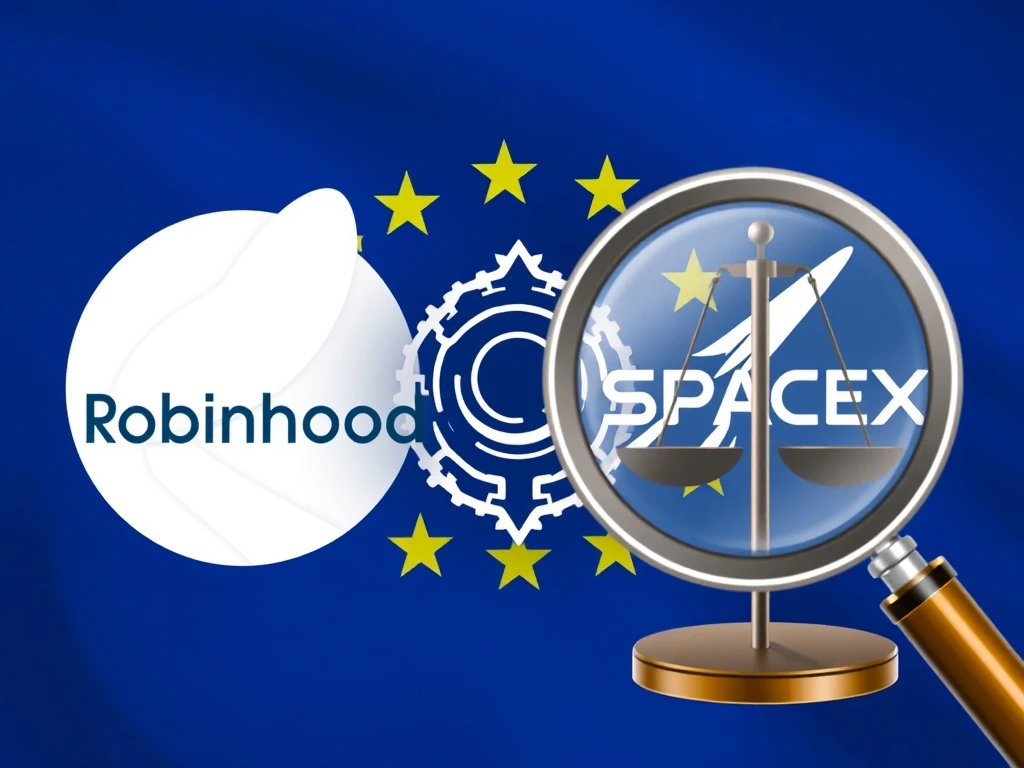Controversial Robinhood Tokenization Faces EU Scrutiny Over OpenAI, SpaceX Tokens

Robinhood’s ambitious push into the world of asset tokenization is currently navigating turbulent regulatory waters, particularly concerning its offerings tied to high-profile private companies like OpenAI and SpaceX. This move, part of the brokerage’s broader strategy to offer tokenized securities in the European Union, has sparked significant debate and prompted a formal inquiry from EU regulators.
Why Robinhood’s OpenAI and SpaceX Tokens Face EU Scrutiny
The core of the issue revolves around the nature of the tokens Robinhood is offering, specifically those linked to OpenAI and SpaceX. While marketed as providing exposure to these companies, OpenAI itself issued a public warning stating that these tokens do not represent any direct equity stake in the company. This clarification immediately raised red flags.
The warning from OpenAI prompted action from Lithuania’s central bank, the primary regulator for Robinhood’s operations in the European Union. The bank is now actively investigating the legality and compliance of these specific tokenized instruments.
Giedrius Šniukas, a spokesperson for the Bank of Lithuania, confirmed that they are “awaiting clarifications” from Robinhood regarding the OpenAI and SpaceX token offerings. The regulatory assessment will only proceed after receiving and evaluating the information provided by Robinhood.
Understanding the Nature of These Tokenized Assets
Despite being referred to as ‘tokens’ providing ‘exposure’ to companies like OpenAI and SpaceX, the fine print reveals a different story. These instruments are not direct shares or equity in the underlying private companies.
As noted by industry observers like Galaxy Research, these so-called equity tokens are essentially derivatives. They are designed to provide indirect exposure to the performance of the underlying asset (the private company’s valuation) without granting actual ownership or shareholder rights.
Here’s a simple breakdown:
- They are digital tokens issued on a blockchain.
- They track the value of a private company (like OpenAI or SpaceX).
- They are derivatives, meaning their value is derived from the underlying asset.
- They do NOT represent actual equity or ownership in the company.
This distinction is crucial and lies at the heart of the current EU scrutiny. Regulators are keen to ensure investors fully understand what they are buying and that these products comply with financial regulations governing derivatives and securities.
Robinhood’s Broader Tokenization Strategy in the EU
The controversy surrounding OpenAI and SpaceX tokens is part of Robinhood’s larger initiative to launch tokenized securities in the European Union. On June 30, the brokerage rolled out a layer-2 blockchain specifically built to support these offerings.
Robinhood has ambitious plans to issue over 200 tokenized US stocks and exchange-traded funds (ETFs) to European investors. The private equity tokens for companies like OpenAI and SpaceX, however, stand out because these companies are not publicly traded, adding another layer of complexity and potential regulatory concern.
The Expanding Tokenization Market Context
Robinhood’s move into tokenized securities reflects a broader trend in the financial industry. The tokenization market, which involves representing real-world assets as digital tokens on a blockchain, is experiencing rapid growth.
Industry estimates place the current value of the tokenization market at over $24 billion. While some experts, like Plume CEO Chris Yin, acknowledge challenges in precise data tracking, the entry of major financial players such as BlackRock and Franklin Templeton underscores the market’s significance.
Recent reports highlight that tokenization is gaining significant traction in specific areas:
- Private credit markets: Tokenization lowers barriers to entry and improves settlement times and liquidity.
- US Treasury debt: This is currently one of the largest drivers of tokenization alongside private credit.
While tokenized stocks currently represent a smaller portion of the market ($188 million according to RWA.xyz data), industry executives believe this sector has the potential for substantial future growth, possibly reaching a trillion-dollar opportunity.
Robinhood is clearly vying for a piece of this expanding pie, but its approach, particularly with private equity derivatives like the OpenAI and SpaceX tokens, is attracting significant regulatory attention.
Conclusion: Awaiting Regulatory Clarity
The situation with Robinhood’s OpenAI and SpaceX tokens highlights the ongoing challenges and regulatory uncertainties surrounding the tokenization of assets, especially those of private companies. The inquiry by Lithuania’s central bank is a critical step in determining the compliance and future viability of such offerings in the EU.
As the tokenization market continues to evolve, clear regulatory frameworks and transparent communication about the nature of tokenized products, particularly derivatives, will be essential for investor protection and market integrity. All eyes are now on Robinhood’s response and the subsequent assessment by the Bank of Lithuania to understand the path forward for these controversial tokenized assets.







